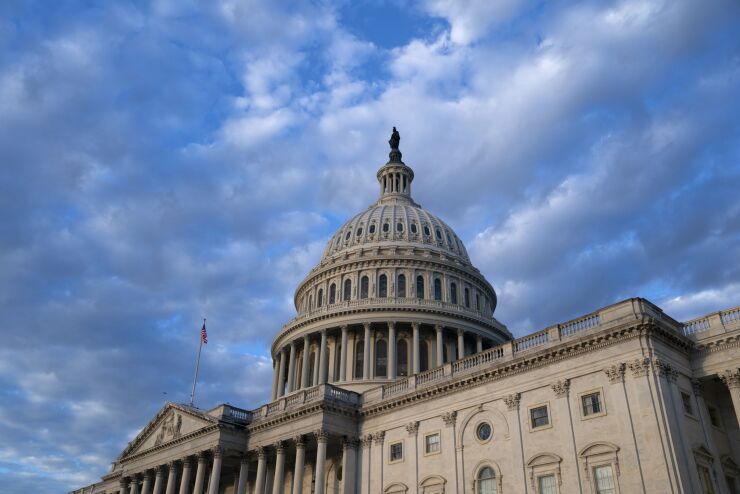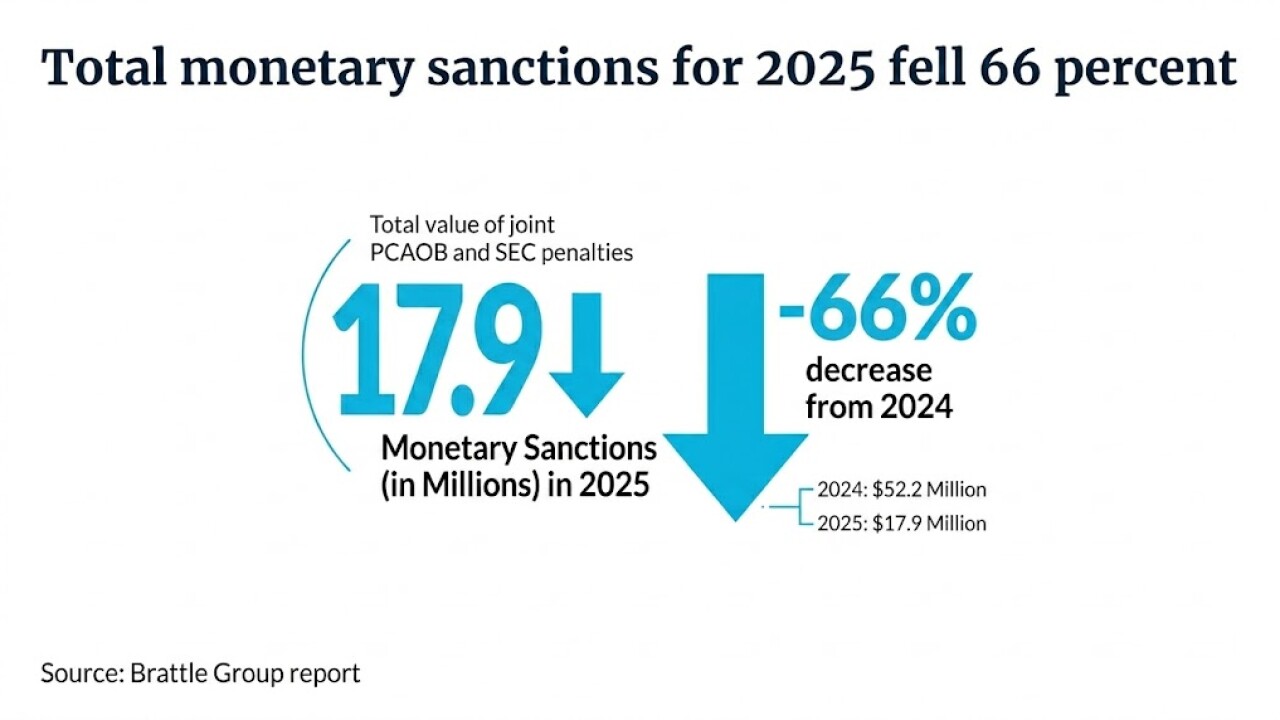The ability to write off research and development expenses in the first year would be revived if the Senate ever manages to pass the
The House passed the bill on Jan. 31, but ever since then, it's been in the hands of the
On Wednesday, Sen. Mike Crapo, R-Idaho, the top Republican on the Senate Finance Committee, threw cold water on the bill's prospects, citing his concerns with provisions related to expanding the Child Tax Credit, which has been the main priority for Democrats.
"Despite the narrative being pushed by some, it is possible to disagree with the CTC policy in this bill and still support both maintaining pro-growth TCJA policies and an expanded CTC for working families," said Crapo in a statement. "That is precisely why I am still working with my Senate colleagues to reach consensus on a path forward. My key concerns, shared by many of my colleagues, remain the same — the prior year's earnings provision must be dropped and replaced with actual tax relief. But with each week that has passed, members have strongly voiced additional calls for numerous modifications, and there are also increasing concerns about making 2023 changes this far into the IRS tax filing season. While I remain committed to seeking a bipartisan resolution that a majority of Senate Republicans can support, I hope the bill's proponents commit to pursuing a more constructive strategy to achieve a mutually agreeable outcome."

When it comes to the research expense provisions, the Tax Relief for American Families and Workers Act would delay the date when taxpayers would need to begin deducting their domestic research or experimental costs over a five-year period until tax years starting after Dec. 31, 2025. Therefore, taxpayers would be able to deduct domestic research or experimental costs that are paid or incurred in tax years starting after Dec. 31, 2021, and before Jan. 1, 2026.
But with the tax legislation currently stalled, companies will have to deal with R&D expensing in the first year, leveraging the guidance issued so far by the IRS and the Treasury Department.
"The law is the law as it currently stands right now," said Sophia Shah, senior manager of federal tax consulting services at Top 100 Firm Crowe LLP, based in New York. "I think companies are still trying to just comply with the law with the guidance available, and that's the advice that we're giving, but probably still hanging onto some hope that maybe this bill passes."
The Senate may end up amending the bill and passing it back to the House.
"It's hard to speculate what Congress may or may not do and what they can actually do," said David Wong, principal and national business incentives group practice leader at Top 10 Firm BDO USA in Los Angeles. "I feel like there's a lot of bipartisan support now. When it comes to the R&D expensing item, the Inflation Reduction Act offered a whole host of new tax credits and incentives for U.S. manufacturing and U.S. components, which was great, but you typically want the R&D and the manufacturing to be happening together in the same country. And with the R&D expense option lapsing, and companies being required to capitalize and amortize them, either over a five- or 15-year period, there's less incentive now to keep the R&D in the U.S. That seems to be very much a flip from how it's been in the past, where companies were more incentivized to keep R&D in the U.S. and less incentivized to have manufacturing in the U.S."
He sees a great deal of support for the R&D expense provisions. "The fact that it passed the House with such a landslide majority, it was evident that this bill certainly has bipartisan support. It's putting a lot of pressure on the Senate," said Wong. "The Senate has been vocal that they're going to really evaluate and mark it up and make changes. To me, the big question is what they're going to ask in return, and what they may add to the bill, in order to pass what's currently in it. My feeling is it's being used more as leverage than a bill at face value."
Companies should be cautious about how they apply R&D expensing for now.
"I don't think any taxpayer really wants to be in a situation of having waited too long, and then ultimately, they're burdened with a significant tax liability that they weren't necessarily expecting, because they didn't apply the law as it stands," said Andrew Eisinger, a tax senior manager at Crowe in Atlanta. "Taxpayers just need to be careful of this, and they need to budget and plan accordingly. A lot of folks out there are continuing to monitor the legislative environment. We do recommend in general extending tax returns so that taxpayers can have enough time to make the decisions that are necessary, while also planning for complying with the laws as it stands."
The IRS chimes in
The IRS has issued some guidance in the meantime. Last September, the agency released
In December, the IRS came out with
"It's about the same as when the initial guidance in September came out," said Crowe's Shah. "In general, more guidance is still welcome. It's great to have favorable provisions mentioned in this guidance, but it still has left us eager for more substantive guidance to ensure compliance with the law."
She would like to see more guidance in general about the provisions in Notice 2023-63, as well as other topics such as partnerships.
"For example, partnerships are heavily impacted by this as well," Shah pointed out. "I think there is still this hunger for guidance, and we're all eagerly awaiting the proposed regulations that are anticipated for 2024. But I did find it very interesting for this low-hanging fruit that they did mention in here, particularly with contractors. The Treasury and the IRS are backpedaling a little bit, saying we recognize that double capitalization might actually be something that impacts a lot of taxpayers. Let's walk that back a little bit and outline some clarifications and modifications to what we had originally put in the interim notice."
Eisinger would like to see more guidance for partnerships on transactions that result in a disposition of the property.
"A lot of taxpayers out there are seeing the guidance that was provided for what I'll call non-partnerships and saying, 'Well, how does something like this apply in the partnership context?'" he said. "I definitely sympathize with the government in the difficulties in crafting guidance that applied to partnerships, which have a very complex set of rules that applies just to them. But it does leave a lot of folks who deal with partnerships scratching their heads and saying, 'Well, we've had issues in 2022, we've had issues in 2023, and we're still not really sure how to deal with these things.' There's a lot left to be desired."
The IRS has been
"It would be interesting to see what comes out of some of these examinations, because partnerships had to take a position, and so each partnership took a position that they thought was appropriate," said Eisinger. "And now if they're dealing with the ramifications and consequences of an examination, how's the IRS looking at this? What's an examining agent saying about how the partnership treated a particular transaction with respect to R&E costs, and it's just the big unknown?"
The timing of the guidance plays a role as well. "In 2023-63, that first initial interim guidance came out on September 8, right before a lot of calendar-year taxpayers were about to file their partnership returns, so it almost would have been a little bit cruel to issue a lot of guidance that applied to partnerships," said Shah. "I understand why maybe partnerships would have been left out, in addition to the complexity of partnership arrangements. But I think the timing is also playing a role in that too, outside of the audit exam environment."
Making a retroactive change in the tax laws would also complicate matters.
"We don't know what the final legislation, if it gets enacted, would look like, but it does appear that Congress is considering the ramifications of a retroactive law change, because the bill in the House did include some language about being able to treat this as a method of accounting that's retroactive and involves a two-year spread period on your 481(a) adjustment, so they are considering it," said Eisinger. "It says a taxpayer may elect to treat it as a change in method of accounting, which seems to imply the ability to either go back and amend or deal with it as a change in method of accounting in a subsequent year, if the next year that hasn't been filed yet. But the IRS will have to look at the law if or when it gets enacted, and decide what procedural guidance is going to be necessary to properly effectuate the law."
Business taxpayers will have to decide if they want to amend their returns if the legislation is passed, and the IRS will need to provide more guidance on how to do that.
"A lot of 2022 taxpayers were severely impacted by Section 174," said Shah. "A lot of them ended up becoming taxable and wondered whether their business could stay afloat because now they owed a lot of tax to the government because of these provisions. I think unwinding it will also cause a need for a lot more guidance."
"If the law goes through, we're going to have to go back and amend," said David Lorenzi, a managing director at Top 100 Firm UHY in Wayland, Massachusetts. "If the law doesn't go through, or they don't make it retroactive, your returns are going to be good. Does it make sense to file now and risk having to go back and amend? Or is it better to go on extension and see how this shakes out? For our clients, we're putting a lot more on extension than we have in the past because we're waiting to see the fallout from this potential tax bill."
He noted that he has many clients who have research and development costs and many who take bonus depreciation, another provision in the bill.
"They would like to be able to deduct the expenses in the year they're incurred," said Lorenzi. "They don't want to capitalize them and write them off over five years. If that change is retroactive, that will help a lot of small businesses."
One clarification that did come out was helpful in terms of the reliance requirement: "Initially that interim guidance that came out in September, Notice 2023-63, said, if you follow any of these provisions, you need to follow all of these provisions," said Shah. "What's really welcomed by taxpayers is this flexibility that came out in this clarification in Notice 2024-12 that says taxpayers now have flexibility to pick and choose which ones meet their fact pattern a little bit more. Taxpayers can now examine their overall tax strategy and ensure consistency year over year for treatment based on certain provisions rather than all provisions. I think that's really welcome to have that flexibility."





